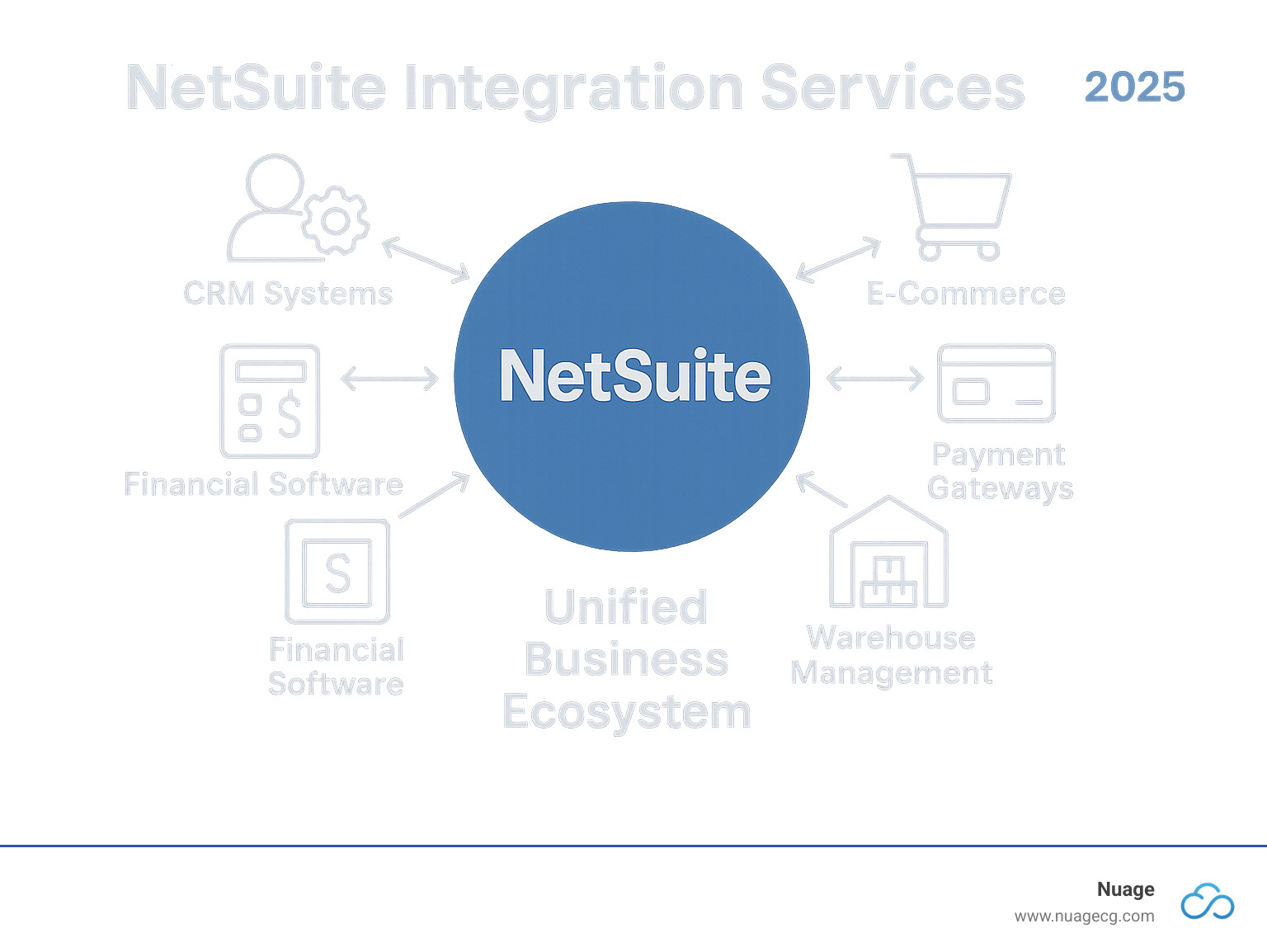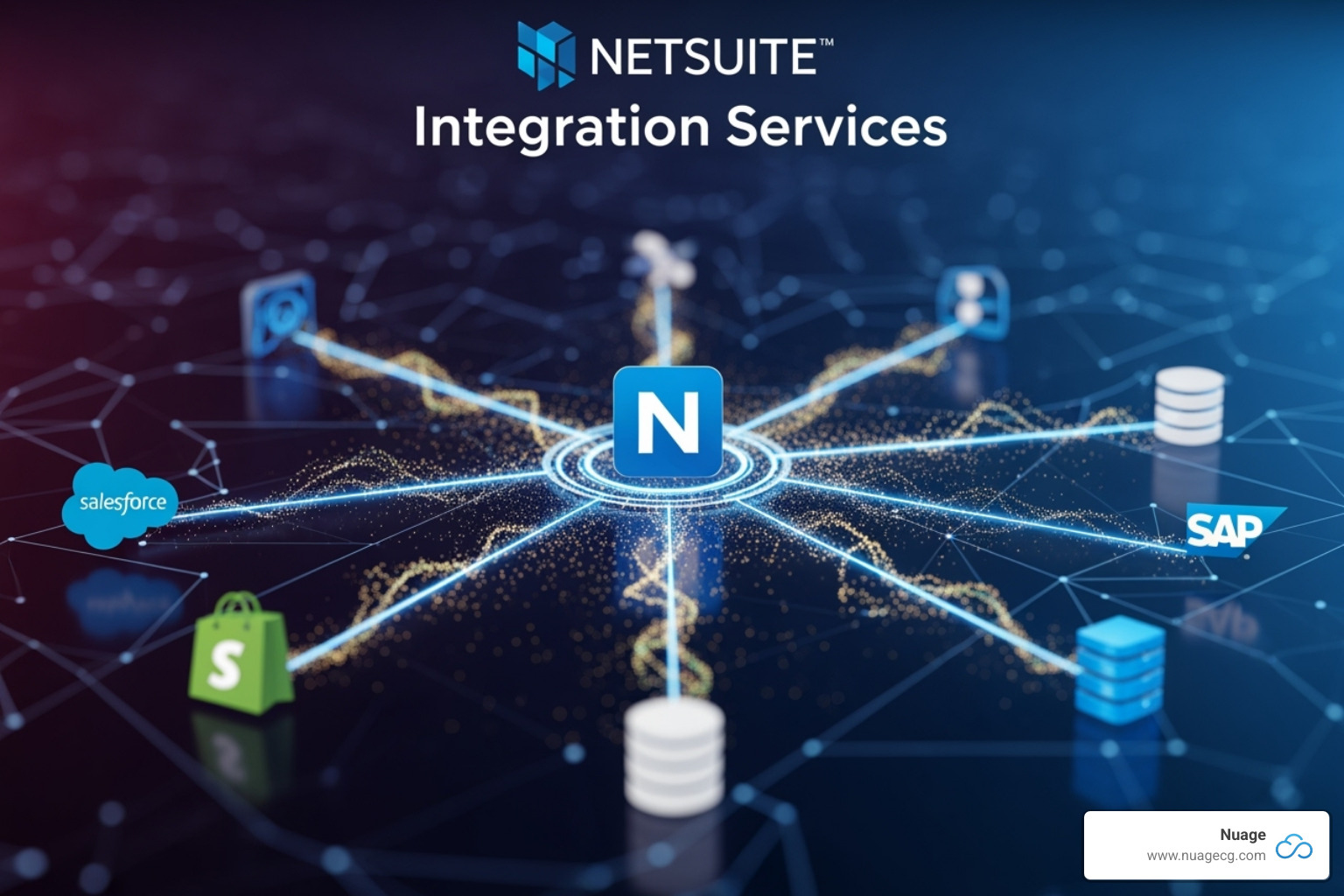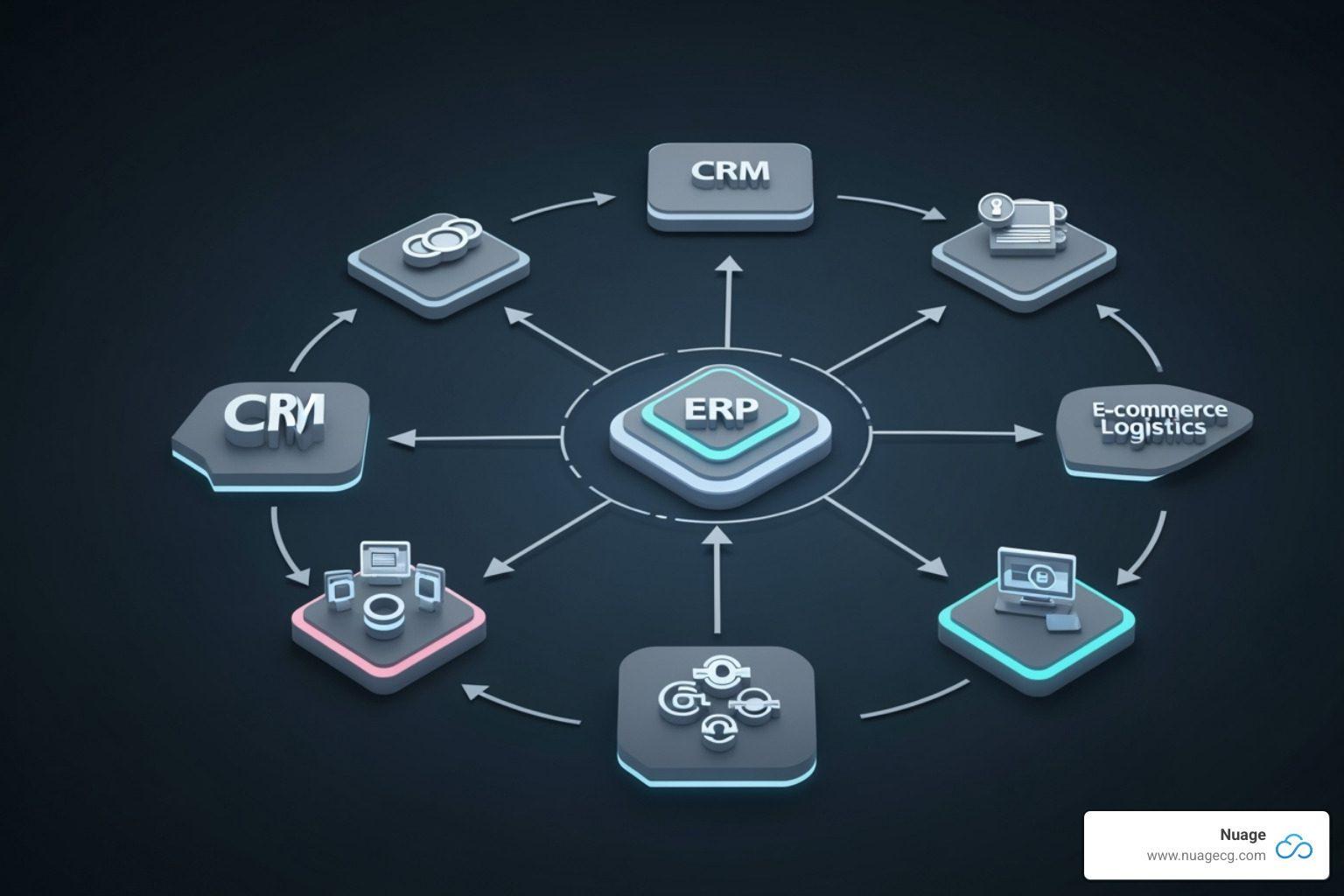Why NetSuite Integration Services Are Critical for Modern Business
NetSuite integration services connect your NetSuite ERP system with other business applications, creating a seamless flow of data across your entire organization. Here’s what you need to know:
- What it is: Connecting NetSuite to CRM, e-commerce, 3PL, payment gateways, and other systems.
- Why it matters: It eliminates manual data entry, reduces errors, and provides real-time visibility.
- Key benefits: A single source of truth, automated workflows, and improved decision-making.
- Common approaches: Point-to-point API connections, iPaaS platforms, or custom integrations.
- Typical integrations: Salesforce, Shopify, Amazon, Stripe, and warehouse management systems.
Switching between multiple systems to manage operations—the “swivel-chair approach”—creates data silos, increases human error, and obscures a complete view of your business performance.
NetSuite integration solves this by connecting your NetSuite ERP system with all your essential business applications. Instead of manually entering the same order into your e-commerce platform, accounting system, and inventory tool, integration automates data synchronization across all systems.
The result is a unified business operation where information flows seamlessly, enabling real-time decision-making and eliminating the inefficiencies that slow growth.
I’m Louis Balla, CRO and partner at Nuage. With over 15 years in digital change and supply chain operations, I specialize in strategic NetSuite integration services, connecting third-party applications to streamline processes and maximize ROI.

Similar topics to netsuite integration services:
What is NetSuite Integration and Why Is It Essential?
Imagine your business operations as an orchestra. Without a conductor, you have chaos. NetSuite integration services act as that conductor, ensuring all your business systems play in harmony.
NetSuite is the #1 cloud ERP for good reason, managing core business processes with impressive depth. However, no single ERP can handle every specialized function your business needs. That’s where integration comes in. Modern businesses use a diverse ecosystem of applications for CRM, e-commerce, or logistics. NetSuite integration services connect these pieces into a unified system.
When we integrate your systems, we create centralized data that flows seamlessly between applications. This gives your sales, finance, and warehouse teams access to the same customer information, inventory levels, and transaction details in real time.
The result is real-time visibility across your entire operation. You’re eliminating data silos and automating business processes that once required manual work. This level of integration is essential for modern business success, leading to improved decision-making and scalability as your business expands.
Want to see how NetSuite Connectors can revolutionize your operations? Check out this video:
What is NetSuite Connector? (Video)
For more in-depth information on how we can optimize your NetSuite experience, visit our dedicated page:
More info about NetSuite Services
The Core Benefits of a Unified System
The benefits of NetSuite integration services transform how your business operates at every level.
- Increased productivity: When data flows automatically, your team stops spending hours on manual tasks and focuses on strategic work that drives growth.
- Reduced operational costs: Fewer manual errors, less rework, and better resource allocation lead to significant savings that can be reinvested in your business.
- Improved data accuracy: Integration ensures information is entered once and synchronized everywhere, creating a reliable single source of truth.
- Streamlined transactions: Your order-to-cash process becomes faster, more transparent, and more reliable as information flows automatically from customer order to fulfillment.
- Improved customer experience: When all teams have a complete customer picture, they can provide efficient, personalized service that drives loyalty.
- Competitive advantage: Integrated businesses are more agile, responsive, and data-driven, allowing them to adapt to market changes faster than competitors.
The ultimate goal is a single, unified platform where all your critical business data lives, creating a more efficient, future-proof business that can scale with your ambitions.
Common Types of NetSuite Integrations by Business Function
NetSuite integration services are flexible, connecting NetSuite to countless applications. We create custom solutions that ensure all your business systems speak the same language.

Here are the most common integrations we implement and the difference they make for our clients.
CRM Integration
Integrating your Customer Relationship Management system with NetSuite provides the coveted 360-degree customer view. When a lead converts in your CRM, their information automatically flows into NetSuite for order processing. Synchronizing leads, sales data, and customer support cases ensures your entire team works from the same playbook.
We frequently connect Salesforce and HubSpot with NetSuite. This gives your sales, support, and finance teams real-time, comprehensive customer data.
For a detailed look at one of our most popular CRM integrations, check out our guide on NetSuite and Salesforce Integration Using Salesforce API.
E-commerce and Marketplace Integration
For businesses selling online, this integration is essential. We connect NetSuite with platforms like Shopify, Amazon, and BigCommerce to create a seamless flow from purchase to fulfillment. Automated order processing means an order placed online appears instantly in NetSuite, inventory is updated, and fulfillment begins. This eliminates manual entry and overselling.
Real-time inventory management is a key benefit. When an item sells on one channel, stock levels update across all others. Product information sync ensures pricing and details are consistent everywhere, leading to streamlined fulfillment and happy customers.
3PL and Warehouse Management (WMS) Integration
Supply chain optimization through 3PL and WMS integration simplifies complex logistics. Connecting NetSuite with your 3PL or WMS provider enables shipping and logistics automation. Orders flow from NetSuite to the warehouse, and shipping confirmations flow back automatically.
Order fulfillment becomes smoother as your warehouse team gets accurate data. Inventory levels stay correct, and reduced manual errors mean fewer unhappy customers and less time spent fixing mistakes. We have experience integrating NetSuite with numerous 3PL and WMS providers, creating seamless connections that simplify complex logistics.
Other Key Integrations
Beyond these core areas, we regularly connect NetSuite with payment gateways like Stripe and PayPal, Human Resources Information Systems (HRIS) for payroll, and project management tools like Jira. The key is to identify which integrations will have the biggest impact on your specific business operations and deliver the most value.
Key Approaches to Integrating with NetSuite
When connecting NetSuite with other systems, there isn’t a one-size-fits-all solution. The best approach depends on your specific needs, the complexity of the integration, and your long-term strategy. Most successful integrations fall into two main categories.

Point-to-Point and Custom API Integrations
This approach involves creating a direct connection between two systems. It’s efficient for simple needs, but as you add more systems, it can create a complex “spaghetti architecture” that is difficult to manage.
NetSuite offers robust Application Programming Interfaces (APIs) like SuiteTalk (SOAP & REST) and RESTlets to make this possible. SuiteTalk provides powerful web services, while RESTlets allow for creating custom RESTful services within NetSuite using SuiteScript. This gives you incredibly specific control over how data flows between systems.
Our team has extensive experience leveraging NetSuite’s APIs for highly customized solutions. If you’re curious about the technical details, check out our insights on NetSuite API Integration and Custom ERP Integration Services.
Integration Platforms as a Service (iPaaS)
An Integration Platform as a Service (iPaaS) acts as a central hub, managing all your integrations from one place. Instead of building individual connections, you use a single platform to connect all your systems efficiently.
The beauty of iPaaS platforms lies in their low-code/no-code approach. They come with pre-built connectors for popular applications, which can dramatically speed up deployment time. Key benefits include:
- Centralized management: All your integrations are managed from a single dashboard, making it easier to monitor, troubleshoot, and update connections.
- Scalability: iPaaS solutions are built to handle high volumes of data and a growing number of integrations, adapting as your business expands.
- User-friendly interfaces: Business users can often manage data flows without deep technical knowledge, reducing the burden on your IT team.
Leading iPaaS providers offer robust capabilities and extensive libraries of pre-built NetSuite connectors. We have extensive experience leveraging these solutions to create streamlined, efficient integrations for our clients. For a deeper dive into one of our most successful approaches, take a look at our guide on Boomi NetSuite Integration.
Choosing the Right Integration Method
Deciding between custom integrations and an iPaaS solution is a strategic decision. Consider the following factors:
- Business needs: Do you require highly specialized data flows (favoring custom) or are your needs more standard (favoring iPaaS)?
- Scalability requirements: If you plan to add multiple systems, an iPaaS offers superior scalability.
- Technical resources: Do you have in-house developers for custom code, or would a low-code platform better suit your team?
- Long-term strategy: Are you looking for a quick fix or a sustainable architecture that supports future growth?
- Total cost of ownership: While iPaaS has subscription fees, it often reduces development and maintenance costs, leading to a lower total cost over time.
The Strategic Value of netsuite integration services
Integrating NetSuite is a strategic move that open ups potential and paves the way for sustainable growth.

Open uping Key Business Benefits
When your systems are seamlessly connected, the benefits extend far beyond simply moving data.
- Improved operational efficiency: Automating workflows makes processes smoother and faster, freeing your team to focus on high-value tasks.
- Data consistency and accuracy: A single source of truth ensures everyone works with the same reliable data, building confidence in reporting.
- 360-degree business view: A holistic, real-time overview of your entire operation empowers better, more informed decision-making.
- Optimized costs: Increased efficiency and reduced errors contribute to lowering operational expenses.
- Adaptability to change: A well-integrated system is more agile and able to adapt quickly to new business requirements and market shifts.
- Reduced IT complexity: Centralized management via iPaaS can simplify your technology landscape compared to a web of point-to-point connections.
- Customer retention and loyalty: Streamlined processes and a complete customer view enable exceptional service, leading to higher satisfaction.
Navigating Common Challenges and Risks
While the benefits are compelling, it’s important to approach netsuite integration services with a clear understanding of potential challenges. Common risks include underestimating complexity, inadequate planning, data quality issues, and security vulnerabilities. We mitigate these risks through:
- Thorough planning: We start with a meticulous plan, defining objectives and data flows upfront.
- Data cleansing and validation: We help ensure your data is clean and consistent before integration begins.
- Proactive security measures: We build in robust security protocols to protect your data.
- Expert execution: Our experienced team anticipates common pitfalls and proactively addresses them to ensure a smooth project.
Understanding the Cost of netsuite integration services
One of the most common questions we hear is, “How much does NetSuite integration cost?” The answer depends on several factors:
- Integration complexity: A simple, one-way sync costs less than a complex, bidirectional integration.
- Number of systems: More connected applications increase the development and management effort.
- Integration method: iPaaS solutions typically involve subscription fees plus implementation costs, while custom integrations have higher upfront development costs.
- Partner selection: An experienced partner might have higher rates but often delivers better long-term value and a more reliable solution.
We provide transparent pricing and scope discussions to ensure you have a clear picture before any project begins.
How to Choose the Right NetSuite Integration Partner
Choosing the right partner for your netsuite integration services is as critical as choosing the right ERP itself. You need a team that understands your business and becomes a true extension of your organization.

What to Look for in a NetSuite Integration Partner
The best partnerships go far beyond just technical skills. You need a guide who truly gets your business and can help you steer the complexities of integration. Look for:
- Deep technical expertise: Your partner must know NetSuite inside and out, from its core architecture to the nuances of its APIs.
- Proven industry experience: A partner who understands your industry will anticipate unique challenges and design relevant solutions.
- Focus on business outcomes: Great partners don’t just connect systems; they understand your goals and recommend the right solution to achieve them.
- Long-term partnership: Integration is an ongoing journey. Look for a partner who will be there for future optimization, support, and troubleshooting.
At Nuage, we act as your NetSuite Optimization Engine. We pair seasoned experts with innovative strategies to simplify complex integrations, collaborating closely with you to provide the technical guidance you need for a truly seamless experience.
For deeper insights into finding the right technical expertise, explore our guide on NetSuite ERP Consultants.
The Planning and Implementation Process for netsuite integration services
A successful NetSuite integration follows a thoughtful, structured process. Here’s how we guide our clients through each critical phase:
- Findy and analysis: We dive deep into your business processes to identify pain points and map out how data flows through your organization.
- Custom integration strategy: We recommend the best integration method (API, iPaaS, or hybrid) and outline the technical architecture based on your budget and goals.
- System design: We create detailed data maps, define business rules, and establish error handling and security protocols from the start.
- Implementation and development: Our team builds and configures the integration according to our carefully crafted design.
- Testing and validation: We conduct rigorous testing, including user acceptance testing, to ensure everything works as intended before it goes live.
- Deployment: We roll out the integration in planned phases to minimize disruption to your daily operations.
- Ongoing support and optimization: We provide continuous support, monitor performance, and optimize the integration as your business evolves.
We believe integration planning should be part of your ERP implementation from the very beginning. This proactive approach minimizes risks and maximizes success. For a comprehensive overview, read about our NetSuite Implementation Best Practices.
Conclusion
After exploring netsuite integration services, it’s clear that integration is the backbone of modern business operations. Connecting NetSuite with your other essential applications creates a unified ecosystem where every piece of information works together seamlessly.
The days of the “swivel-chair approach” and manual data entry are over. Integration creates a real-time operational environment where your sales team, finance department, and warehouse all speak the same language.
The benefits are tangible: improved operational efficiency, consistent, accurate data, and a 360-degree view of your business. These advantages empower you to make smarter decisions and act on opportunities quickly.
While challenges like data quality issues and security concerns are real, they are entirely manageable with the right partner and a solid plan. With thorough planning and expert execution, integration becomes a strategic advantage rather than a technical headache.
Integration transforms scattered business data into a flowing river of actionable insights. It’s the difference between reacting to problems and proactively preventing them. When your systems work in harmony, your entire business operates more smoothly, your customers receive better service, and you gain the agility to adapt to market changes.
At Nuage, we’ve spent over 20 years helping businesses steer their digital change journeys. We don’t just sell software; we partner with you to determine the right solutions that align with your specific needs and maximize your NetSuite investment.
We believe that when your systems work together seamlessly, your business doesn’t just survive—it thrives. Integration isn’t the end goal; it’s the foundation that enables everything else you want to achieve.
Ready to transform your business operations and open up the full potential of your NetSuite ERP? We’d love to explore how netsuite integration services can drive your success.
Let’s discuss your integration strategy

